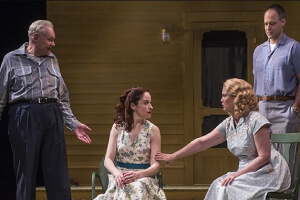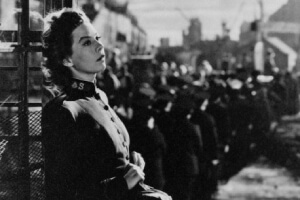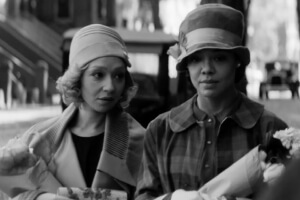Arthur Miller’s All My Sons continues to be relevant today, over 70 years since its relevance. Considered one of Miller’s masterpieces, this play preoccupies itself with the issue of moral responsibility in the face of guilt and the devastating impact of war. At more profound layers of psychology and ethics, All My Sons is a reminder of ways in which an individual’s actions may be colored with reverberations echoing down through a family, a community, and even a nation. This review will delve into the dramatic core, the performances, the overall impact, and the current relevance of the play.
Secrecy Tearing Apart a Family

In the period after World War II, Joe Keller was an American businessman who was once among the very successful plane-part manufacturers during the conflict. The plot begins to unfold when the son, Larry, is presumed dead in combat, and everything in the Keller family begins to fall apart. As the play deepens, it appears that Eli’s father washed his hands of a corruption that cost the lives of young soldiers, including the young men themselves. These tensions are heightened as the family’s facade comes crashing down over Joe’s infamous wrongdoings.
All My Sons rescues its power through its probing look at personal guilt and responsibility. At the heart of the tragedy is Joe’s refusal to accept what he has done and the agony that his wife Kate continually writers through due to her refusal to accept that their son Larry is no longer with them. Miller presents an evocatively tragic picture of a brutal truth that past the glaring light of war seldom sees daylight on the homes of those who are left behind.
Guilt, Denial, and Accountability
The theme of social responsibilities borne on moral grounds is central to the play. The material investigation is built around Joe Keller’s culpability for sending cracked airplane parts into the war effort, occasioning the death of young soldiers. He tells how circumstances forced him to make such a decision just to feed his family, sooner or later, one life against another.
Miller shows us that Keller’s guilt is not even in the forefront of his shame: it’s felt in the very heart of the family life. Kate denies Larry’s death to protect herself from the crushing reality of Joe’s involvement in it. The play shows how these psychological effects of the war ricochet through families and thrust upon them consequences far beyond their control.
The Cast That Breathes Life into a Classic
The basis of dramatic strength in All My Sons rests with the players. The Joe Keller actor attempts to portray both contradictory notions of a loving father and an immoral man, putting forth vulnerability and conviction as he sinks deep into his guilt.
Equally compelling is the portrayal of Kate Keller, whose character exhibits maternal agony and denial. The interesting transition in her comprehension of Joe’s deeds further adds to the emotional content of the play.
Contra Choruses, the supporting rolls of Chris Keller and Ann Deever, build the grade of the drama, with Chris giving an act of moral consciousness when confronting Joe for his faults.
An Exciting Eye-Opening Experience

The direction of All My Sons has evolved such that the intensity of Miller’s words should be dramatized with utmost weight and seriousness. The design is purposely made simple, highlighting the domestic space of the Keller family home, adding to the sense of claustrophobia that permeates the narrative. The house feels almost like a prison, an emblem of emotional confinement that the characters experience wrestling with their version of the truth.
A deliberately slow build-up to tension leads to an emotionally crushing climax. The production painstakingly avoids melodrama; instead, it leans heavily on Miller’s layered text and the actors’ finely honed performances to convey the stakes of deep emotional resonance.
A Must-See Masterpiece
All My Sons is a very potent, thought-provoking play that continues to enthrall audiences with its candid view of the implications war has on families. These themes of guilt, responsibility, and denial are timeless and relevant today as they were in the post-world period. Having approached Miller’s masterpiece for the first time or a new rerun, it would lead one deep into the study of human emotion and moral consequence. It reminds us that, at the weight of their actions, we all bear it, and sometimes the truth becomes bitter to be faced.
Explore further

Introducing Shaw’s Women – Female Strength on Stage
George Bernard Shaw is perhaps most well known for his characteristic satire and wit, creating socially engaging plays that brought key social issues to the limelight. Venturing from the romanticized theatre to what could be best described as social realism on stage, Shaw was not afraid to delve into contentious political or societal topics.
Continue Reading…
What Passing is About – Nella Larsen’s 1929 Classic
Passing, in this novel, refers to Racial Passing, a practice in which people conceal their racial identity to gain acceptance and or social validation. The novel Passing, written in 1929 by Nella Larsen, explores the life of Irene Redfield, an African American woman who lives in Harlem. The book received positive feedback when it was released, but did not really take off outside of New York.
Continue Reading…Uncover More
George Bernard Shaw, Irish playwright (Nobel Prize in Literature, 1925), was born in Dublin on this day in 1856. pic.twitter.com/3ZPOGvKRPk
— Bibliophilia (@Libroantiguo) July 26, 2016
MEET THE PRINCIPAL CAST OF PADDINGTON THE MUSICAL!🐻
Rehearsals for PADDINGTON The Musical started this week, and we have some rather exciting news to share. Meet the wonderful principal cast!⭐
They enjoyed a splendid tea party together until Paddington had a little mishap…… pic.twitter.com/imRX9Gu4dy
— ATGtickets (@ATGTICKETS) August 21, 2025

